Piano Sheet Music
 "If a composer could say what he had to say in words he would not bother trying to say it in music. " Gustav Mahler
"If a composer could say what he had to say in words he would not bother trying to say it in music. " Gustav Mahler
Family Guy

Family Guy is an animated American television sitcom created by Seth MacFarlane and airing on Fox. The show centers on a dysfunctional family that lives in the fictional town of Quahog, Rhode Island. The show uses frequent "cutaway gags", jokes in the form of tangential vignettes that do not advance the story.
Family Guy was cancelled once in 2000 and again in 2002, but strong DVD sales and the large viewership of reruns on Cartoon Network's Adult Swim convinced Fox to resume the show in 2005. It is the first cancelled show to be resurrected based on DVD sales and the only one to be resurrected twice on that basis.
Family Guy was cancelled once in 2000 and again in 2002, but strong DVD sales and the large viewership of reruns on Cartoon Network's Adult Swim convinced Fox to resume the show in 2005. It is the first cancelled show to be resurrected based on DVD sales and the only one to be resurrected twice on that basis.
Kiss
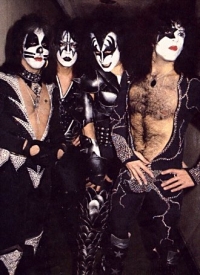
Kiss (also typeset as KISS) is an American rock band formed in New York City in December 1972. Easily identified by its members' trademark face paint and stage outfits, the group rose to prominence in the mid-1970s on the basis of their elaborate live performances, which featured fire-breathing, blood spitting, smoking guitars, and pyrotechnics. Kiss has been awarded 24 gold albums to date. The group's worldwide sales exceed 100 million albums.
The original lineup of Paul Stanley (vocals and rhythm guitar), Gene Simmons (vocals and bass guitar), Ace Frehley (lead guitar and vocals), and Peter Criss (drums, percussion and vocals) is the most successful and identifiable. With their makeup and costumes, they took on the personae of comic book-style characters: The Demon (Simmons), Starchild (Stanley), Spaceman (Frehley), and The Catman (Criss). The band explains that the fans were the ones who ultimately chose their makeup designs. The "Demon" makeup reflected Gene's cynicism and dark elements, as well as his love for comic books. Paul Stanley became the "Starchild" due to his tendency to be referred to as the "starry-eyed lover" and "hopeless romantic." Ace Frehley's "Spaceman" makeup was a reflection of him wanting to go for a ride in a space ship and supposedly being from another planet. Peter Criss' "Catman" makeup was in accordance with the belief that Peter had nine lives due to his rough childhood in Brooklyn. Due to creative differences, both Criss and Frehley were out of the group by 1982. The band's commercial fortunes had also waned considerably by that point.
In 1983, Kiss abandoned its makeup and enjoyed a commercial resurgence throughout the rest of the decade. Buoyed by a wave of Kiss nostalgia in the 1990s, the band announced a reunion of the original lineup (with makeup) in 1996. The resulting Kiss Alive/Worldwide/Lost Cities/Reunion Tour was the top-grossing act of 1996 and 1997. Criss and Frehley have since left Kiss again and have been replaced by Eric Singer and Tommy Thayer, respectively. The band continues to perform with makeup, while Stanley and Simmons have remained the only two constant members.
The original lineup of Paul Stanley (vocals and rhythm guitar), Gene Simmons (vocals and bass guitar), Ace Frehley (lead guitar and vocals), and Peter Criss (drums, percussion and vocals) is the most successful and identifiable. With their makeup and costumes, they took on the personae of comic book-style characters: The Demon (Simmons), Starchild (Stanley), Spaceman (Frehley), and The Catman (Criss). The band explains that the fans were the ones who ultimately chose their makeup designs. The "Demon" makeup reflected Gene's cynicism and dark elements, as well as his love for comic books. Paul Stanley became the "Starchild" due to his tendency to be referred to as the "starry-eyed lover" and "hopeless romantic." Ace Frehley's "Spaceman" makeup was a reflection of him wanting to go for a ride in a space ship and supposedly being from another planet. Peter Criss' "Catman" makeup was in accordance with the belief that Peter had nine lives due to his rough childhood in Brooklyn. Due to creative differences, both Criss and Frehley were out of the group by 1982. The band's commercial fortunes had also waned considerably by that point.
In 1983, Kiss abandoned its makeup and enjoyed a commercial resurgence throughout the rest of the decade. Buoyed by a wave of Kiss nostalgia in the 1990s, the band announced a reunion of the original lineup (with makeup) in 1996. The resulting Kiss Alive/Worldwide/Lost Cities/Reunion Tour was the top-grossing act of 1996 and 1997. Criss and Frehley have since left Kiss again and have been replaced by Eric Singer and Tommy Thayer, respectively. The band continues to perform with makeup, while Stanley and Simmons have remained the only two constant members.
Koji Kondo

Koji Kondo (近藤浩治 Kondō Kōji?, born August 13, 1960) is a Japanese video game composer and sound director who has been employed at Nintendo since 1984. He is best known for scoring numerous titles in the Mario and The Legend of Zelda series.
Joachim Andersen
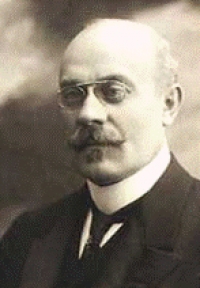
Carl Joachim Andersen (April 29, 1847 – May 7, 1909) was a Danish flutist, conductor and composer born in Copenhagen, son of the flutist Christian Joachim Andersen. Both as a virtuoso and as composer of flute music, he is considered one of the best of his time. He was a tough leader and teacher and demanded as such a lot from his orchestras but through that style he reached a high level.
Gottschalk
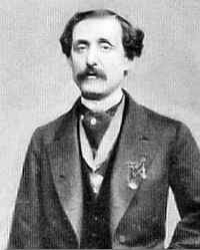
Louis Moreau Gottschalk was an American composer and pianist, best known as a virtuoso performer of his own romantic piano works. He spent most of his working career outside of the United States.
Brahms

Johannes Brahms (May 7, 1833 â April 3, 1897) was a German composer of the Romantic period. He was born in Hamburg and in his later years he settled in Vienna, Austria.
Brahms maintained a Classical sense of form and order in his works â in contrast to the opulence of the music of many of his contemporaries. Thus many admirers (though not necessarily Brahms himself) saw him as the champion of traditional forms and "pure music," as opposed to the New German embrace of program music.
Brahms venerated Beethoven: in the composer's home, a marble bust of Beethoven looked down on the spot where he composed, and some passages in his works are reminiscent of Beethoven's style. The main theme of the finale of Brahms's First Symphony is reminiscent of the main theme of the finale of Beethoven's Ninth, and when this resemblance was pointed out to Brahms he replied that any ass â jeder Esel â could see that.
Ein deutsches Requiem was partially inspired by his mother's death in 1865, but also incorporates material from a Symphony he started in 1854, but abandoned following Schumann's suicide attempt. He once wrote that the Requiem "belonged to Schumann". The first movement of this abandoned Symphony was re-worked as the first movement of the First Piano Concerto.
Brahms also loved the Classical composers Mozart and Haydn. He collected first editions and autographs of their works, and edited performing editions. He also studied the music of pre-classical composers, including Giovanni Gabrieli, Johann Adolph Hasse, Heinrich Schütz and especially Johann Sebastian Bach. His friends included leading musicologists, and with Friedrich Chrysander he edited an edition of the works of François Couperin. He looked to older music for inspiration in the arts of strict counterpoint; the themes of some of his works are modelled on Baroque sources, such as Bach's The Art of Fugue in the fugal finale of Cello Sonata No. 1, or the same composer's Cantata No. 150 in the passacaglia theme of the Fourth Symphony's finale.
Brahms maintained a Classical sense of form and order in his works â in contrast to the opulence of the music of many of his contemporaries. Thus many admirers (though not necessarily Brahms himself) saw him as the champion of traditional forms and "pure music," as opposed to the New German embrace of program music.
Brahms venerated Beethoven: in the composer's home, a marble bust of Beethoven looked down on the spot where he composed, and some passages in his works are reminiscent of Beethoven's style. The main theme of the finale of Brahms's First Symphony is reminiscent of the main theme of the finale of Beethoven's Ninth, and when this resemblance was pointed out to Brahms he replied that any ass â jeder Esel â could see that.
Ein deutsches Requiem was partially inspired by his mother's death in 1865, but also incorporates material from a Symphony he started in 1854, but abandoned following Schumann's suicide attempt. He once wrote that the Requiem "belonged to Schumann". The first movement of this abandoned Symphony was re-worked as the first movement of the First Piano Concerto.
Brahms also loved the Classical composers Mozart and Haydn. He collected first editions and autographs of their works, and edited performing editions. He also studied the music of pre-classical composers, including Giovanni Gabrieli, Johann Adolph Hasse, Heinrich Schütz and especially Johann Sebastian Bach. His friends included leading musicologists, and with Friedrich Chrysander he edited an edition of the works of François Couperin. He looked to older music for inspiration in the arts of strict counterpoint; the themes of some of his works are modelled on Baroque sources, such as Bach's The Art of Fugue in the fugal finale of Cello Sonata No. 1, or the same composer's Cantata No. 150 in the passacaglia theme of the Fourth Symphony's finale.
Mozart

Wolfgang Amadeus Mozart, full name Johann Chrysostom Wolfgang Amadeus Mozart (27 January 1756 â 5 December 1791) was a prolific and influential composer of the Classical era. His over 600 compositions include works widely acknowledged as pinnacles of symphonic, concertante, chamber, piano, operatic, and choral music. Mozart is among the most enduringly popular of classical composers, and many of his works are part of the standard concert repertoire.
Mozart's music, like Haydn's, stands as an archetypal example of the Classical style. His works spanned the period during which that style transformed from one exemplified by the style galant to one that began to incorporate some of the contrapuntal complexities of the late Baroque, complexities against which the galant style had been a reaction. Mozart's own stylistic development closely paralleled the development of the classical style as a whole. In addition, he was a versatile composer and wrote in almost every major genre, including symphony, opera, the solo concerto, chamber music including string quartet and string quintet, and the piano sonata. While none of these genres were new, the piano concerto was almost single-handedly developed and popularized by Mozart. He also wrote a great deal of religious music, including masses; and he composed many dances, divertimenti, serenades, and other forms of light entertainment.
The central traits of the classical style can be identified in Mozart's music. Clarity, balance, and transparency are hallmarks of his work.
Mozart's music, like Haydn's, stands as an archetypal example of the Classical style. His works spanned the period during which that style transformed from one exemplified by the style galant to one that began to incorporate some of the contrapuntal complexities of the late Baroque, complexities against which the galant style had been a reaction. Mozart's own stylistic development closely paralleled the development of the classical style as a whole. In addition, he was a versatile composer and wrote in almost every major genre, including symphony, opera, the solo concerto, chamber music including string quartet and string quintet, and the piano sonata. While none of these genres were new, the piano concerto was almost single-handedly developed and popularized by Mozart. He also wrote a great deal of religious music, including masses; and he composed many dances, divertimenti, serenades, and other forms of light entertainment.
The central traits of the classical style can be identified in Mozart's music. Clarity, balance, and transparency are hallmarks of his work.
Yann Tiersen

Guillaume Yann Tiersen (born 23 June 1970) is a French musician and composer known internationally for composing the score to the Jean-Pierre Jeunet movie Amélie. His music is recognized by its use of a large variety of instruments in relatively minimalist compositions, often with a touch of either European classical music or French folk music, using primarily the piano, accordion or violin together with instruments like the melodica, xylophone, toy piano, ondes martenot, harpsichord and typewriter. His musical style is reminiscent of Frédéric Chopin, Erik Satie, Philip Glass and Michael Nyman.
Thelonious Monk
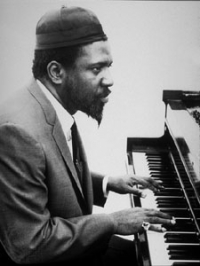
Thelonious Sphere Monk was an American jazz pianist and composer. He had a unique improvisational style and made numerous contributions to the standard jazz repertoire, including "'Round Midnight", "Blue Monk", "Straight, No Chaser", "Ruby, My Dear", "In Walked Bud", and "Well, You Needn't"
Counting Crows

Counting Crows is a rock band originating from Berkeley, California. The group gained popularity in 1994 following the release of its debut album August and Everything After, which featured the hit single "Mr. Jones". The band's influences include Van Morrison, R.E.M., Nirvana, Bob Dylan, and The Band. They received a 2004 Academy Award nomination for the song "Accidentally in Love".
Augustana
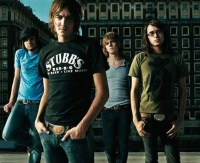
Augustana is an American rock band from San Diego, California who are signed to the Epic Records record label and are best known for their single, "Boston."
Augustana's debut album, Midwest Skies and Sleepless Mondays was released in 2003 and only 1000 copies were produced, later that year the band recorded Mayfield EP and only 25 copies were made. After band members Dan Layus and Josiah Rosen had formed Augustana in Greenville, Illinois, they moved to southern California where they found their drummer, Justin South. Augustana were then soon discovered by Grammy-Award winning record producer Stephen Short, along with Michael Rosenblatt, who became their managers and helped them sign a record deal with Epic Records as well as a publishing deal with EMI. Short and Rosenblatt continue to manage the band. The band found fame with their second album, All the Stars and Boulevards, which sold 300,000 copies in the United States, including over 1,000,000 singles of "Boston".
Augustana's debut album, Midwest Skies and Sleepless Mondays was released in 2003 and only 1000 copies were produced, later that year the band recorded Mayfield EP and only 25 copies were made. After band members Dan Layus and Josiah Rosen had formed Augustana in Greenville, Illinois, they moved to southern California where they found their drummer, Justin South. Augustana were then soon discovered by Grammy-Award winning record producer Stephen Short, along with Michael Rosenblatt, who became their managers and helped them sign a record deal with Epic Records as well as a publishing deal with EMI. Short and Rosenblatt continue to manage the band. The band found fame with their second album, All the Stars and Boulevards, which sold 300,000 copies in the United States, including over 1,000,000 singles of "Boston".
Traditional

Robert Charlebois
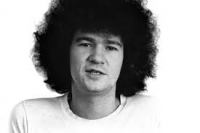
Robert Charlebois, OC, OQ (born June 25, 1944) is a Québecois author, composer, musician, performer and actor.
Robert Charlebois in Montreal, 1972,Charlebois was born in Montreal, Quebec. Among his best known songs are Lindberg (the duo with Louise Forestier in particular), Ordinaire, Les Ailes d'un Ange and Je reviendrai à Montréal. His lyrics, often written in joual, are funny, relying upon plays on words. He won the Sopot International Song Festival in 1970.
Robert Charlebois in Montreal, 1972,Charlebois was born in Montreal, Quebec. Among his best known songs are Lindberg (the duo with Louise Forestier in particular), Ordinaire, Les Ailes d'un Ange and Je reviendrai à Montréal. His lyrics, often written in joual, are funny, relying upon plays on words. He won the Sopot International Song Festival in 1970.
Robert Glasper

Robert Andre Glasper (born April 6, 1978) is an American pianist, record producer, songwriter and musical arranger with a career that bridges musical and artistic genres. To date, Glasper has won four Grammy Awards and received nine nominations across eight categories. He also won the 2017 Primetime Emmy Award for Outstanding Original Music and Lyrics for his song featured in Ava DuVernay’s critically hailed documentary, 13th, with Common and Karriem Riggins.
Joni Mitchell

Joni Mitchell was born on November 7, 1943, in Fort Macleod, Canada. In 1968, she recorded her first, self-titled album. Other highly successful albums followed. Mitchell won her first Grammy Award (best folk performance) for her 1969 album, Clouds. She has won seven more Grammy Awards since then, in several different categories, including traditional pop, pop music and lifetime achievement.
Ravel

Joseph-Maurice Ravel (March 7, 1875 – December 28, 1937) was a French composer of Impressionist music known especially for his melodies, orchestral and instrumental textures and effects. Much of his piano music, chamber music, vocal music and orchestral music has entered the standard concert repertoire.
Ravel's piano compositions, such as Jeux d'eau, Miroirs and Gaspard de la Nuit, demand considerable virtuosity from the performer, and his orchestral music, including Daphnis et Chloé and his arrangement of Modest Mussorgsky's Pictures at an Exhibition, uses a variety of sound and instrumentation very effectively.
Ravel is perhaps known best for his orchestral work, Boléro (1928), which he considered trivial and once described as "a piece for orchestra without music."
According to SACEM, Ravel's estate earns more royalties than that of any other French musician. According to international copyright law, Ravel's works are public domain since January 1, 2008 in most countries. In France, due to anomalous copyright law extensions to account for the two world wars, they will not enter the public domain until 2015.
Ravel's piano compositions, such as Jeux d'eau, Miroirs and Gaspard de la Nuit, demand considerable virtuosity from the performer, and his orchestral music, including Daphnis et Chloé and his arrangement of Modest Mussorgsky's Pictures at an Exhibition, uses a variety of sound and instrumentation very effectively.
Ravel is perhaps known best for his orchestral work, Boléro (1928), which he considered trivial and once described as "a piece for orchestra without music."
According to SACEM, Ravel's estate earns more royalties than that of any other French musician. According to international copyright law, Ravel's works are public domain since January 1, 2008 in most countries. In France, due to anomalous copyright law extensions to account for the two world wars, they will not enter the public domain until 2015.
Alicia Keys

Alicia J. Augello-Cook (born January 25, 1981), and has won numerous awards, including eleven Grammy Awards, seventeen Billboard Music Awards, three American Music Awards.
Her debut album Songs in A Minor was a worldwide success, selling nearly 11 millions albums, and received five Grammy Awards in 2002, with Alicia winning Best New Artist and also Song of the Year for "Fallin'".
Her debut album Songs in A Minor was a worldwide success, selling nearly 11 millions albums, and received five Grammy Awards in 2002, with Alicia winning Best New Artist and also Song of the Year for "Fallin'".
ABBA

ABBA was a Swedish Eurovision Song Contest-winning pop music group active between 1972 and 1982. Benny Andersson, Björn Ulvaeus, Anni-Frid Lyngstad (Frida), Agnetha Fältskog are in ABBA. They topped the charts worldwide from the mid-1970s to the early 1980s. The name "ABBA" is an acronym formed from the first letters of each of the group member's given name (Agnetha, Björn, Benny, Anni-Frid).
ABBA gained immense international popularity employing catchy song hooks, simple lyrics, and a Wall of Sound achieved by overdubbing the female singers' voices in multiple harmonies. As their popularity grew, they were sought-after to tour Europe, Australia, and North America, drawing crowds of near-hysterical fans ("ABBAholics"), notably in Australia. Touring became a contentious issue, being particularly unpopular with Agnetha, but they continued to release studio albums to great commercial success. At the height of their popularity, however, both marriages of the band members (Benny with Frida, and Björn with Agnetha) failed, and the relationship changes were reflected in their music, as they produced more thoughtful lyrics with different compositions.
They remain a fixture of radio playlists and are one of the world's best selling bands, having sold around 400 million records world wide; The music of ABBA has been re-arranged into the successful musical Mamma Mia! that has toured worldwide and a movie version was released in July 2008. All four of the former members of ABBA were present at the Stockholm premieres of both the musical (2005) and the film (2008). The film première took place at the Benny Andersson-owned Rival theatre at Mariatorget, Stockholm on 4 July 2008.
ABBA gained immense international popularity employing catchy song hooks, simple lyrics, and a Wall of Sound achieved by overdubbing the female singers' voices in multiple harmonies. As their popularity grew, they were sought-after to tour Europe, Australia, and North America, drawing crowds of near-hysterical fans ("ABBAholics"), notably in Australia. Touring became a contentious issue, being particularly unpopular with Agnetha, but they continued to release studio albums to great commercial success. At the height of their popularity, however, both marriages of the band members (Benny with Frida, and Björn with Agnetha) failed, and the relationship changes were reflected in their music, as they produced more thoughtful lyrics with different compositions.
They remain a fixture of radio playlists and are one of the world's best selling bands, having sold around 400 million records world wide; The music of ABBA has been re-arranged into the successful musical Mamma Mia! that has toured worldwide and a movie version was released in July 2008. All four of the former members of ABBA were present at the Stockholm premieres of both the musical (2005) and the film (2008). The film première took place at the Benny Andersson-owned Rival theatre at Mariatorget, Stockholm on 4 July 2008.
Astor Piazzolla

Ástor Pantaleón Piazzolla (March 11, 1921 – July 4, 1992) was an Argentine tango composer and bandoneón player. His oeuvre revolutionized the traditional tango into a new style termed nuevo tango, incorporating elements from jazz and classical music. An excellent bandoneonist, he regularly performed his own compositions with different ensembles.
Piazzolla's nuevo tango was distinct from the traditional tango in its incorporation of elements of jazz, its use of extended harmonies and dissonance, its use of counterpoint, and its ventures into extended compositional forms. As Argentine psychoanalyst Carlos Kuri has pointed out, Piazzolla's fusion of tango with this wide range of other recognizable Western musical elements was so successful that it produced a new individual style transcending these influences. It is precisely this success, and individuality, that makes it hard to pin down where particular influences reside in his compositions, but some aspects are clear. The use of the passacaglia technique of a circulating bass line and harmonic sequence, invented and much used in 17th and 18th century baroque music but also central to the idea of jazz "changes", predominates in most of Piazzolla's mature compositions. Another clear reference to the baroque is the often complex and virtuosic counterpoint that sometimes follows strict fugal behavior but more often simply allows each performer in the group to assert his voice. A further technique that emphasises this sense of democracy and freedom among the musicians is improvisation that is borrowed from jazz in concept, but in practice involves a different vocabulary of scales and rhythms that stay within the parameters of the established tango sound-world. Pablo Ziegler has been particularly responsible for developing this aspect of the style both within Piazzolla's groups and since the composer's death.
Piazzolla's nuevo tango was distinct from the traditional tango in its incorporation of elements of jazz, its use of extended harmonies and dissonance, its use of counterpoint, and its ventures into extended compositional forms. As Argentine psychoanalyst Carlos Kuri has pointed out, Piazzolla's fusion of tango with this wide range of other recognizable Western musical elements was so successful that it produced a new individual style transcending these influences. It is precisely this success, and individuality, that makes it hard to pin down where particular influences reside in his compositions, but some aspects are clear. The use of the passacaglia technique of a circulating bass line and harmonic sequence, invented and much used in 17th and 18th century baroque music but also central to the idea of jazz "changes", predominates in most of Piazzolla's mature compositions. Another clear reference to the baroque is the often complex and virtuosic counterpoint that sometimes follows strict fugal behavior but more often simply allows each performer in the group to assert his voice. A further technique that emphasises this sense of democracy and freedom among the musicians is improvisation that is borrowed from jazz in concept, but in practice involves a different vocabulary of scales and rhythms that stay within the parameters of the established tango sound-world. Pablo Ziegler has been particularly responsible for developing this aspect of the style both within Piazzolla's groups and since the composer's death.
Eric Satie

Éric Alfred Leslie Satie (Honfleur, 17 May 1866 – Paris, 1 July 1925) was a French composer and pianist. Starting with his first composition in 1884, he signed his name as Erik Satie.
Satie was introduced as a "gymnopedist" in 1887, shortly before writing his most famous compositions, the Gymnopédies. Later, he also referred to himself as a "phonometrician" (meaning "someone who measures sounds") preferring this designation to that of "musician", after having been called "a clumsy but subtle technician" in a book on contemporary French composers published in 1911.
In addition to his body of music, Satie also left a remarkable set of writings, having contributed work for a range of publications, from the dadaist 391 to the American Vanity Fair. Although in later life he prided himself on always publishing his work under his own name, in the late nineteenth century he appears to have used pseudonyms such as Virginie Lebeau and François de Paule in some of his published writings.
Satie was a colourful figure in the early 20th century Parisian avant-garde. He was a precursor to later artistic movements such as minimalism, repetitive music, and the Theatre of the Absurd.
Satie was introduced as a "gymnopedist" in 1887, shortly before writing his most famous compositions, the Gymnopédies. Later, he also referred to himself as a "phonometrician" (meaning "someone who measures sounds") preferring this designation to that of "musician", after having been called "a clumsy but subtle technician" in a book on contemporary French composers published in 1911.
In addition to his body of music, Satie also left a remarkable set of writings, having contributed work for a range of publications, from the dadaist 391 to the American Vanity Fair. Although in later life he prided himself on always publishing his work under his own name, in the late nineteenth century he appears to have used pseudonyms such as Virginie Lebeau and François de Paule in some of his published writings.
Satie was a colourful figure in the early 20th century Parisian avant-garde. He was a precursor to later artistic movements such as minimalism, repetitive music, and the Theatre of the Absurd.
Brian Crain
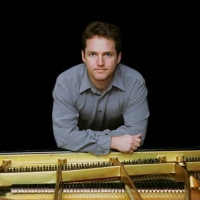
Since 1996 Brian Crain has been composing, recording and distributing music through his own record company, Crain Records, Inc.Date of birth: Hollywood, Los Angeles, California, USA Education: San Diego State University
Works with: NUB MUSIC, BrianCrain.com Records, Crain Records, Lifestyle Music Group
Works with: NUB MUSIC, BrianCrain.com Records, Crain Records, Lifestyle Music Group
Franz Lehar
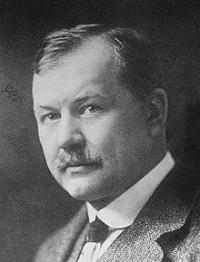
Franz Lehár (30 April 1870 – 24 October 1948) was an Austrian composer. He is mainly known for his operettas of which the most successful and best known is The Merry Widow (Die lustige Witwe).
Pietro Mascgani
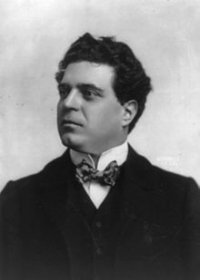
Pietro Mascagni was an Italian composer primarily known for his operas. His 1890 masterpiece Cavalleria rusticana caused one of the greatest sensations in opera history and single-handedly ushered in the Verismo movement in Italian dramatic music.
West Side Story
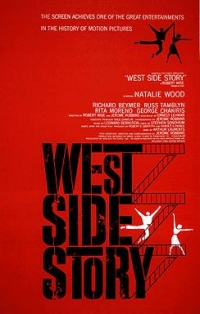
West Side Story is a 1961 film directed by Robert Wise and Jerome Robbins. It is an adaptation of the Broadway musical of the same name, adapted from William Shakespeare's Romeo and Juliet. It stars Natalie Wood, Richard Beymer, Russ Tamblyn, Rita Moreno, George Chakiris, and was photographed by Daniel L. Fapp, A.S.C. in Super Panavision 70.
The action was filmed largely in Los Angeles on sets designed by Boris Leven, although the film's opening sequence was shot on the streets of New York City, mainly in the area where the Lincoln Center campus of Fordham University now stands. The construction of the new campus was halted to allow completion of the sequence. Jerome Robbins, who had directed the stage version, was responsible for planning and directing all music and dance sequences in the film, as well as all the fight scenes. When approximately 60% of principal photography was complete, the producers became concerned that the production was over-budget and Robbins was fired. His final contribution before leaving the film was to write out the staging for the rumble.
The film was released on October 18, 1961 through United Artists. It received praise from critics and the public and became the second highest grossing film of the year, domestically. The film won ten Academy Awards in its eleven nominated categories as well as a special award for Robbins, including Best Picture. The soundtrack album made more money than any other album before it.
The action was filmed largely in Los Angeles on sets designed by Boris Leven, although the film's opening sequence was shot on the streets of New York City, mainly in the area where the Lincoln Center campus of Fordham University now stands. The construction of the new campus was halted to allow completion of the sequence. Jerome Robbins, who had directed the stage version, was responsible for planning and directing all music and dance sequences in the film, as well as all the fight scenes. When approximately 60% of principal photography was complete, the producers became concerned that the production was over-budget and Robbins was fired. His final contribution before leaving the film was to write out the staging for the rumble.
The film was released on October 18, 1961 through United Artists. It received praise from critics and the public and became the second highest grossing film of the year, domestically. The film won ten Academy Awards in its eleven nominated categories as well as a special award for Robbins, including Best Picture. The soundtrack album made more money than any other album before it.
Dire Straits
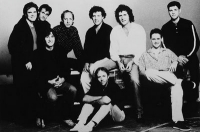
Dire Straits were an English rock band, formed in 1977 by Mark Knopfler (guitar and vocals), his brother David Knopfler (guitar), John Illsley (bass), and Pick Withers (drums), and subsequently managed by Ed Bicknell. Although the band was formed in an era when punk rock reigned, Dire Straits worked within the conventions of classic rock, albeit with a stripped-down sound that appealed to modern audiences weary of the overproduced stadium rock of the 1970s. In their early days, Mark and David requested that pub owners turn down the amps so that patrons could converse while the band played — indicative of their unassuming demeanor. Despite this oddly self-effacing approach to rock and roll, Dire Straits soon became hugely successful, with their first album going multi-platinum globally.
The band's best-known songs include "Sultans of Swing", "Romeo and Juliet", "Tunnel of Love", "Telegraph Road", "Private Investigations", "Money for Nothing", "Walk of Life", "So Far Away", "Brothers in Arms" and "Calling Elvis".
Dire Straits and Mark Knopfler have sold in excess of 118 million albums to date.
The band's best-known songs include "Sultans of Swing", "Romeo and Juliet", "Tunnel of Love", "Telegraph Road", "Private Investigations", "Money for Nothing", "Walk of Life", "So Far Away", "Brothers in Arms" and "Calling Elvis".
Dire Straits and Mark Knopfler have sold in excess of 118 million albums to date.
Gustav Mahler

Gustav Mahler was an Austrian late-Romantic composer, and one of the leading conductors of his generation. As a composer he acted as a bridge between the 19th century Austro-German tradition and the modernism of the early 20th century.
The Lion King (Musical)

The Lion King is a musical based on the 1994 Disney animated film of the same name with music by Elton John and lyrics by Tim Rice along with the musical score created by Hans Zimmer with choral arrangements by Lebo M. Directed by Julie Taymor, the musical features actors in animal costumes as well as giant, hollow puppets. The show is produced by Disney Theatrical.
The musical debuted July 8, 1997, in Minneapolis, Minnesota at the Orpheum Theatre, and was an instant success before premiering on Broadway at the New Amsterdam Theater on October 15, 1997 in previews with the official opening on November 13, 1997. On June 13, 2006, the Broadway production moved to the Minskoff Theatre to make way for the musical version of Mary Poppins, where it is still running. It is now Broadway's ninth longest-running show in history.
The show debuted in the West End's Lyceum Theatre on October 19, 1999 and is still running. The cast of the West End production were invited to perform at the Royal Variety Performance 2008 at the London Palladium on December 11, in the presence of senior members of the British Royal Family.
The musical debuted July 8, 1997, in Minneapolis, Minnesota at the Orpheum Theatre, and was an instant success before premiering on Broadway at the New Amsterdam Theater on October 15, 1997 in previews with the official opening on November 13, 1997. On June 13, 2006, the Broadway production moved to the Minskoff Theatre to make way for the musical version of Mary Poppins, where it is still running. It is now Broadway's ninth longest-running show in history.
The show debuted in the West End's Lyceum Theatre on October 19, 1999 and is still running. The cast of the West End production were invited to perform at the Royal Variety Performance 2008 at the London Palladium on December 11, in the presence of senior members of the British Royal Family.
Nikita Koshkin

Nikita Arnoldovich Koshkin (Russian: Никита Арнольдович Кошкин; born 28 February 1956) is a classical guitarist-composer born in Moscow.
His early influences included Stravinsky, Shostakovich and Prokofiev, as well as rock music. Koshkin first came to prominence with his suite The Prince's Toys, completed in 1980 and first performed by the Czech-born guitarist Vladimir Mikulka.
Koshkin's best-known guitar work is Usher-Waltz (1984), a piece inspired by the Edgar Allan Poe story The Fall of the House of Usher, written for the guitarist Vladislav Blaha. It was made famous by John Williams' performance in the Seville Concert CD in 1993. Other famous performers of Koshkin's work include the Assad Duo and the Zagreb and Amsterdam Trios. His other important works include the set of variations The Porcelain Tower and the Andante quasi Passacaglia e Toccata: The Fall of Birds (1978). Besides writing works for solo guitar, Koshkin has composed guitar-ensemble music as well; in addition to numerous pieces for guitar duo, he has written two works for guitar quartet, Changing the Guard (1994) and Suite for Four Guitars (composed for the Georgia Guitar Quartet, 2007).
Contents
1 Early life
2 Discography
2.1 As performer
3 See also
4 References
Early life
Koshkin received his first guitar from his grandfather, along with a recording of Segovia's, which inspired him to become a guitarist, despite his parents intending a diplomatic career for him. Koshkin studied classical guitar at the Moscow College of Music under Georgi Emanov and later at the Gnessin Institute under Alexander Frauchi, with compositional teaching from Victor Egorov.
Discography
As performer
The Prince's Toys: Koshkin Plays Koshkin. SR 1011. Soundset Recordings, 1998.
The Well-Tempered Koshkin. SR 1015. Soundset Recordings, 2001.
Oratorium. kr10052. Kreuzberg Records, Germany.
See also
This section is empty. You can help by adding to it. (July 2019)
References
http://plum.cream.org/williams/records/054.htm
http://physiology.med.unc.edu/tgs/artists/koshkin/nikita_koshkin_bio.html
http://www.melbay.com/authors.asp?author=673
http://www.soundset.com/cd_detail.php?artist=&disc=koshkin_toys&item=notes&view=standard
Authority control Edit this at Wikidata
BNF: cb14785785x (data) GND: 134784162 ISNI: 0000 0001 0776 7720 LCCN: n94084501 MusicBrainz: 5d23b810-c081-483e-be9a-073738e39bed NKC: xx0064631 NTA: 252033639 SNAC: w6g81bcc VIAF: 7574408 WorldCat Identities (via VIAF): 7574408
His early influences included Stravinsky, Shostakovich and Prokofiev, as well as rock music. Koshkin first came to prominence with his suite The Prince's Toys, completed in 1980 and first performed by the Czech-born guitarist Vladimir Mikulka.
Koshkin's best-known guitar work is Usher-Waltz (1984), a piece inspired by the Edgar Allan Poe story The Fall of the House of Usher, written for the guitarist Vladislav Blaha. It was made famous by John Williams' performance in the Seville Concert CD in 1993. Other famous performers of Koshkin's work include the Assad Duo and the Zagreb and Amsterdam Trios. His other important works include the set of variations The Porcelain Tower and the Andante quasi Passacaglia e Toccata: The Fall of Birds (1978). Besides writing works for solo guitar, Koshkin has composed guitar-ensemble music as well; in addition to numerous pieces for guitar duo, he has written two works for guitar quartet, Changing the Guard (1994) and Suite for Four Guitars (composed for the Georgia Guitar Quartet, 2007).
Contents
1 Early life
2 Discography
2.1 As performer
3 See also
4 References
Early life
Koshkin received his first guitar from his grandfather, along with a recording of Segovia's, which inspired him to become a guitarist, despite his parents intending a diplomatic career for him. Koshkin studied classical guitar at the Moscow College of Music under Georgi Emanov and later at the Gnessin Institute under Alexander Frauchi, with compositional teaching from Victor Egorov.
Discography
As performer
The Prince's Toys: Koshkin Plays Koshkin. SR 1011. Soundset Recordings, 1998.
The Well-Tempered Koshkin. SR 1015. Soundset Recordings, 2001.
Oratorium. kr10052. Kreuzberg Records, Germany.
See also
This section is empty. You can help by adding to it. (July 2019)
References
http://plum.cream.org/williams/records/054.htm
http://physiology.med.unc.edu/tgs/artists/koshkin/nikita_koshkin_bio.html
http://www.melbay.com/authors.asp?author=673
http://www.soundset.com/cd_detail.php?artist=&disc=koshkin_toys&item=notes&view=standard
Authority control Edit this at Wikidata
BNF: cb14785785x (data) GND: 134784162 ISNI: 0000 0001 0776 7720 LCCN: n94084501 MusicBrainz: 5d23b810-c081-483e-be9a-073738e39bed NKC: xx0064631 NTA: 252033639 SNAC: w6g81bcc VIAF: 7574408 WorldCat Identities (via VIAF): 7574408
Chopin

Frédéric Chopin (1 March 1810 – 17 October 1849) was a Polish composer and virtuoso pianist of the Romantic period. He is widely regarded as the greatest Polish composer, and ranks as one of music's greatest tone poets.
He was born in the village of Żelazowa Wola, in the Duchy of Warsaw, to a Polish mother and French-expatriate father, and in his early life was regarded as a child-prodigy pianist. In November 1830, at the age of 20, Chopin went abroad; following the suppression of the Polish November Uprising of 1830–31, he became one of many expatriates of the Polish "Great Emigration."
In Paris, he made a comfortable living as a composer and piano teacher, while giving few public performances. A Polish patriot,
Chopin's extant compositions were written primarily for the piano as a solo instrument. Though technically demanding, Chopin's style emphasizes nuance and expressive depth rather than virtuosity. Chopin invented musical forms such as the ballade and was responsible for major innovations in forms such as the piano sonata, waltz, nocturne, étude, impromptu and prelude. His works are mainstays of Romanticism in 19th-century classical music.
He was born in the village of Żelazowa Wola, in the Duchy of Warsaw, to a Polish mother and French-expatriate father, and in his early life was regarded as a child-prodigy pianist. In November 1830, at the age of 20, Chopin went abroad; following the suppression of the Polish November Uprising of 1830–31, he became one of many expatriates of the Polish "Great Emigration."
In Paris, he made a comfortable living as a composer and piano teacher, while giving few public performances. A Polish patriot,
Chopin's extant compositions were written primarily for the piano as a solo instrument. Though technically demanding, Chopin's style emphasizes nuance and expressive depth rather than virtuosity. Chopin invented musical forms such as the ballade and was responsible for major innovations in forms such as the piano sonata, waltz, nocturne, étude, impromptu and prelude. His works are mainstays of Romanticism in 19th-century classical music.
Duffy

Amy Anne Duffy (born 23 June 1984) , is a Welsh singer, songwriter and actress named after Shane Duffy.Her debut album, Rockferry, released in 2008, became the best-selling album in the United Kingdom that year and led to worldwide attention. It spawned the successful single "Mercy". In 2009, Duffy received the Grammy Award for Best Pop Vocal Album for Rockferry, one of three nominations, and won three out of four Brit Awards nominations, for British Breakthrough, Best British Female and Best British Album. In 2010, she made her acting debut in the film Patagonia and released her second studio album Endlessly to moderate success.
Imogen Heap

Imogen Jennifer Heap (/ˈɪmədʒᵻn ˈhiːp/; born 9 December 1977) is an English singer-songwriter and composer. She is known for her work as part of the musical duo Frou Frou and her solo albums, which she writes, produces, and mixes. She has produced four solo albums. Her 2009 album, Ellipse, was a North American chart success that earned Heap two Grammy nominations, winning Best Engineered Album, Non-Classical in recognition of her technical and engineering work on the record. In 2010 she received the British Academy's Ivor Novello Award for International Achievement.
Joey Contreras

Joey Contreras is a musical theatre and pop songwriter originally from California. He is internationally known for his albums Love Me, Love Me Not, Young Kind of Love, & Joyride which feature an all-star lineup of Broadway and Pop talent and have spawned performances of his music worldwide.His song-cycle, In Pieces, was originally presented at Lincoln Center and has since been made available for worldwide licensing. In 2021 the London production company, Future Spotlight Productions, developed the musical into a feature film, starring established West End performers as well as emerging talent. His musicals with bookwriter/lyricist, Kate Thomas, include All The Kids Are Doing It (Provincetown Playhouse, Tisch, IWU, O’Neill NMTC Finalist), Forget Me Not (Open Jar Institute, NYU, The Dare Tactic, dir. Catie Davis) and Elements. He is also currently developing Heartbreakers in Hell, with bookwriter/lyricist Benjamin Halstead. Additionally he has written music for the Walt Disney Company, and various short films.
Egberto Gismonti

Egberto Amin Gismonti (born December 5, 1947 in Carmo, state of Rio de Janeiro) is a Brazilian composer, guitarist and pianist.Gismonti was born in the small city of Carmo, state of Rio de Janeiro, Brazil, into a musical family. His mother was from Sicily and his father was from Beirut, Lebanon. At the age of six, he started studying the piano at the Brazilian Conservatory of Music. After studying the classical repertoire in Brazil for fifteen years, he went to Paris to delve into modern music. He studied with Nadia Boulanger (1887–1979), after acceptance as a student by the composer Jean Barraqué, a student of Anton Webern and Schoenberg. Boulanger encouraged Gismonti to write the collective Brazilian experience into his music.
Franz Schubert

Franz Peter Schubert (German pronunciation: ; January 31, 1797 – November 19, 1828) was an Austrian composer. He wrote some 600 Lieder, nine symphonies (including the famous "Unfinished Symphony"), liturgical music, operas, some incidental music, and a large body of chamber and solo piano music. He is particularly noted for his original melodic and harmonic writing.
Schubert was born into a musical family, and received formal musical training through much of his childhood. While Schubert had a close circle of friends and associates who admired his work (amongst them the prominent singer Johann Michael Vogl), wide appreciation of his music during his lifetime was limited at best. He was never able to secure adequate permanent employment, and for most of his career he relied on the support of friends and family. He made some money from published works, and occasionally gave private musical instruction. In the last year of his life he began to receive wider acclaim. He died at the age of 31 of "typhoid fever", a diagnosis which was vague at the time; several scholars suspect the real illness was tertiary syphilis.
Interest in Schubert's work increased dramatically in the decades following his death. Composers like Franz Liszt, Robert Schumann and Felix Mendelssohn discovered, collected, and championed his works in the 19th century, as did musicologist Sir George Grove. Franz Schubert is now widely considered to be one of the greatest composers in the Western tradition.
Schubert was born into a musical family, and received formal musical training through much of his childhood. While Schubert had a close circle of friends and associates who admired his work (amongst them the prominent singer Johann Michael Vogl), wide appreciation of his music during his lifetime was limited at best. He was never able to secure adequate permanent employment, and for most of his career he relied on the support of friends and family. He made some money from published works, and occasionally gave private musical instruction. In the last year of his life he began to receive wider acclaim. He died at the age of 31 of "typhoid fever", a diagnosis which was vague at the time; several scholars suspect the real illness was tertiary syphilis.
Interest in Schubert's work increased dramatically in the decades following his death. Composers like Franz Liszt, Robert Schumann and Felix Mendelssohn discovered, collected, and championed his works in the 19th century, as did musicologist Sir George Grove. Franz Schubert is now widely considered to be one of the greatest composers in the Western tradition.
Giovanni Bottesini
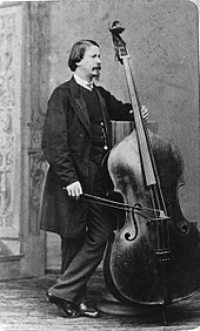
Giovanni Bottesini (22 December 1821 – 7 July 1889), was an Italian Romantic composer, conductor, and a double bass virtuoso.Born in Crema, Lombardy, he was taught the rudiments of music by his father, an accomplished clarinetist and composer, at a young age and had played timpani in Crema with the Teatro Sociale before the age of eleven. He studied violin with Carlo Cogliati, and probably would have continued on this instrument except for a unique turn of events. His father sought a place for him in the Milan Conservatory, but due to the Bottesini family's lack of money, Bottesini needed a scholarship.
Edward Elgar

Sir Edward William Elgar, 1st Baronet OM, GCVO (2 June 1857 – 23 February 1934) was an English composer, many of whose works have entered the British and international classical concert repertoire. Among his best-known compositions are orchestral works including the Enigma Variations, the Pomp and Circumstance Marches, concertos for violin and cello, and two symphonies. He also composed choral works, including The Dream of Gerontius, chamber music and songs. He was appointed Master of the King's Musick in 1924.
Astor Piazzola

Astor Pantaleón Piazzolla (Spanish pronunciation: , Italian pronunciation: ; March 11, 1921 – July 4, 1992) was an Argentine tango composer, bandoneon player, and arranger. His oeuvre revolutionized the traditional tango into a new style termed nuevo tango, incorporating elements from jazz and classical music. A virtuoso bandoneonist, he regularly performed his own compositions with a variety of ensembles.
In 1992, American music critic Stephen Holden described Piazzolla as "the world's foremost composer of tango music"
In 1992, American music critic Stephen Holden described Piazzolla as "the world's foremost composer of tango music"
David Shire
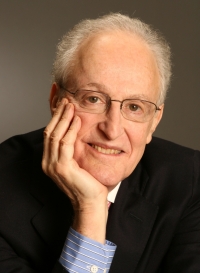
David Lee Shire (born July 3, 1937) is an American songwriter and composer of stage musicals, film and television scores. The soundtracks to the 1976 film The Big Bus, The Taking of Pelham One Two Three, The Conversation and All the President's Men, and parts of the Saturday Night Fever soundtrack such as "Manhattan Skyline", are some of his best-known works. His other work includes the score of the 1985 film Return to Oz (the "sequel-in-part" of The Wizard of Oz), and the stage musical scores of Baby, Big, Closer Than Ever, and Starting Here, Starting Now. Shire is married to actress Didi Conn.
Julio Domínguez
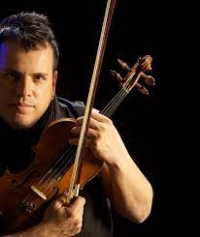
Violinist, Philharmonic Orchestra of Buenos Aires; Member, Gianneo String Quartet (which has toured to the major Chamber festivals in the world spreading Argentine music). Awards: Argentine Society of Music Critics Prize (three times, with Gianneo). Training: violin and viola at the Menuhin Academy (London, Switzerland) and in the Reina Sofia School in Madrid.
Anthony Fedorov

Anatoliy Vladimirovich "Anthony" Fedorov (Russian: Анатолий Владимирович Фёдоров; born May 4, 1985) is an American singer and actor who is former lead singer for the Chicago band 7th Heaven. He rose to fame as the fourth place finalist on the fourth season of American Idol.
Andre ferrante

Andrea Ferrante is an Italian composer whose music is performed throughout Europe, Asia and the Americas and published by Videoradio and Rai Trade Labels, Edizioni Carrara and Edizioni Simeoli.
Adam Lambert

Adam Mitchel Lambert is an American singer, songwriter and actor. Since 2009, he has sold over 3 million albums and 5 million singles worldwide. Lambert rose to fame in 2009 after finishing as runner-up on the eighth season of American Idol.
Beethoven

Ludwig van Beethoven (16 December 1770 - 26 March 1827) was a German composer and pianist. He was a crucial figure in the transitional period between the Classical and Romantic eras in Western classical music, and remains one of the most respected and influential composers of all time.
Born in Bonn, then in the Electorate of Cologne (now in modern-day Germany), he moved to Vienna in his early twenties and settled there, studying with Joseph Haydn and quickly gaining a reputation as a virtuoso pianist. Beethoven's hearing gradually deteriorated beginning in his twenties, yet he continued to compose masterpieces, and to conduct and perform, even after he was completely deaf.
Born in Bonn, then in the Electorate of Cologne (now in modern-day Germany), he moved to Vienna in his early twenties and settled there, studying with Joseph Haydn and quickly gaining a reputation as a virtuoso pianist. Beethoven's hearing gradually deteriorated beginning in his twenties, yet he continued to compose masterpieces, and to conduct and perform, even after he was completely deaf.
Katy Perry

Katy Perry (born Katheryn Elizabeth Hudson; October 25, 1984) is an American singer-songwriter. She has risen to prominence with her 2008 single "I Kissed a Girl" which has become a worldwide hit topping the charts in more than 20 countries, including United Kingdom, Canada, Australia, Ireland, and the United States, where it was the 1000th Billboard Hot 100 number 1. Perry has stated in the press that it's thanks to successful British singer-songwriters Amy Winehouse and Lily Allen that more female artists had been appearing on the charts. She went on to say that Winehouse and Allen "have introduced America to great music". She is known for her unconventional style of dress, often humoristic, bright in color and reminiscent of different decades, as well as her frequent use of fruit-shaped accessories, mainly watermelon as part of her outfits. Perry has a contralto vocal range.
Stevie Wonder

Stevie Wonder (born Stevland Hardaway Judkins on May 13, 1950, name later changed to Stevland Hardaway Morris) is an American singer-songwriter, multi-instrumentalist, and record producer. A prominent figure in popular music during the latter half of the 20th century , Wonder has recorded more than thirty top ten hits, won 26 Grammy Awards (a record for a solo artist), plus one for lifetime achievement, won an Academy Award for Best Song and been inducted into both the Rock and Roll and Songwriters halls of fame. He has also been awarded the Polar Music Prize.
Blind from infancy, Wonder signed with Motown Records as a pre-adolescent at age twelve, and continues to perform and record for the label to this day. He has nine U.S. number-one hits to his name (on the pop Charts, 20 U.S. R&B number one hits), and album sales totaling more than 150 million units. Wonder has recorded several critically acclaimed albums and hit singles, and writes and produces songs for many of his label mates and outside artists as well. Wonder plays the piano, synthesizer, harmonica, congas, drums, bongos, organ, melodica, and clavinet. In his early career, he was best known for his harmonica work, but today he is better known for his keyboard skills and vocals.
Blind from infancy, Wonder signed with Motown Records as a pre-adolescent at age twelve, and continues to perform and record for the label to this day. He has nine U.S. number-one hits to his name (on the pop Charts, 20 U.S. R&B number one hits), and album sales totaling more than 150 million units. Wonder has recorded several critically acclaimed albums and hit singles, and writes and produces songs for many of his label mates and outside artists as well. Wonder plays the piano, synthesizer, harmonica, congas, drums, bongos, organ, melodica, and clavinet. In his early career, he was best known for his harmonica work, but today he is better known for his keyboard skills and vocals.
Francisco Tarrega
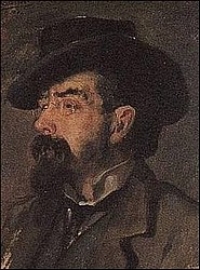
Francisco de Asís Tárrega y Eixea (21 November 1852 – 15 December 1909) was an influential Spanish composer and guitarist of the Romantic period.
Shirley Temple
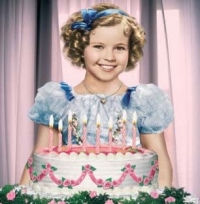
Shirley Temple (born April 23, 1928) is an American actress and public servant. The daughter of George and Gertrude Temple, she began her screen career in 1932 at the age of three with comedy shorts and bit parts in feature films. Following her breakthrough film Stand Up and Cheer! in 1934, she skyrocketed to superstardom the same year with the Christmas release of Bright Eyes, a feature film designed specifically for her talents. Star status was confirmed with an Academy Award in February 1935, and blockbusting super hits such as Curly Top and Heidi followed year after year during the mid to late 1930s. Licensed merchandise that included dolls, dishes, and clothing capitalized on her image.She is the youngest person ever to be awarded an Oscar (age 6), she was awarded the inaugural (now retired) non-competitive Academy Juvenile Award in 1934. Temple's popularity waned in her teens and she left Twentieth Century-Fox at the age of twelve to attend high school. She appeared in a few films of varying quality in her mid to late teens, and retired completely from the silver screen in 1950 at the age of twenty-one. She starred in twenty-four films for Twentieth Century-Fox, and was the top box-office draw four years in a row (1935–1938) in a Motion Picture Herald poll.
Temple's parents were powerful forces in their daughter's rise to stardom and success. Gertrude Temple enrolled her daughter in dance school, doggedly made the rounds of casting offices, read scripts to her daughter, crafted her emotional, physical, and vocal expressions, monitored her daughter's performance from a chair placed beside the camera, conducted her own interviews, and received a paid position at Twentieth Century-Fox as Temple's coach and hairdresser. Temple's father was a bank employee who managed his daughter's wealth through astute investments. In 1945, against her parents' better judgment, seventeen-year-old Temple married Army Air Force sergeant John Agar, who, after being discharged from the service, entered the acting profession. The couple made two films together before Temple divorced him on the grounds of mental cruelty in 1949, receiving custody of their daughter Linda Susan and the restoration of her maiden name in the process. In January 1950, Temple met the conservative scion of a patrician California family and United States Navy Silver Star recipient Charles Alden Black. She married him in December 1950 following the finalization of her divorce and retired from films the same day to become a homemaker. Charles Alden Black, Jr. was born in 1952 and Lori Alden Black in 1954. In 1972, Shirley Temple Black was one of the first prominent women to speak openly about breast cancer after undergoing a modified radical mastectomy.
In 1958, Temple returned to show biz with Shirley Temple's Storybook, a live-action television anthology series featuring fairy tale adaptations. Temple played hostess and narrated or acted in episodes. Stars Charlton Heston, Claire Bloom, Elsa Lanchester, Rod McKuen, Joel Grey and others appeared on the show. The series chalked up a single season, left the air for a season, and returned for its final season in color in 1960 as The Shirley Temple Show. The reprise included adaptations of material other than fairy tales such as Ludwig Bemelmans's Madeline, and Nathaniel Hawthorne's The House of the Seven Gables. Temple made guest appearances on various television shows in the early 1960s and filmed a sitcom pilot that was never released. Temple sat on the boards of many corporations and organizations including The Walt Disney Company, Del Monte Foods, and the National Wildlife Federation. In the mid 1960s, she entered public life, ran unsuccessfully for United States Congress in 1967, and received appointments as United States Ambassador to Ghana in 1974 and to Czechoslovakia in 1989. In 1988, she published her autobiography, Child Star. Temple has received many awards and honors over her lifetime including Kennedy Center Honors and a Screen Actors Guild Life Achievement Award.
Temple's parents were powerful forces in their daughter's rise to stardom and success. Gertrude Temple enrolled her daughter in dance school, doggedly made the rounds of casting offices, read scripts to her daughter, crafted her emotional, physical, and vocal expressions, monitored her daughter's performance from a chair placed beside the camera, conducted her own interviews, and received a paid position at Twentieth Century-Fox as Temple's coach and hairdresser. Temple's father was a bank employee who managed his daughter's wealth through astute investments. In 1945, against her parents' better judgment, seventeen-year-old Temple married Army Air Force sergeant John Agar, who, after being discharged from the service, entered the acting profession. The couple made two films together before Temple divorced him on the grounds of mental cruelty in 1949, receiving custody of their daughter Linda Susan and the restoration of her maiden name in the process. In January 1950, Temple met the conservative scion of a patrician California family and United States Navy Silver Star recipient Charles Alden Black. She married him in December 1950 following the finalization of her divorce and retired from films the same day to become a homemaker. Charles Alden Black, Jr. was born in 1952 and Lori Alden Black in 1954. In 1972, Shirley Temple Black was one of the first prominent women to speak openly about breast cancer after undergoing a modified radical mastectomy.
In 1958, Temple returned to show biz with Shirley Temple's Storybook, a live-action television anthology series featuring fairy tale adaptations. Temple played hostess and narrated or acted in episodes. Stars Charlton Heston, Claire Bloom, Elsa Lanchester, Rod McKuen, Joel Grey and others appeared on the show. The series chalked up a single season, left the air for a season, and returned for its final season in color in 1960 as The Shirley Temple Show. The reprise included adaptations of material other than fairy tales such as Ludwig Bemelmans's Madeline, and Nathaniel Hawthorne's The House of the Seven Gables. Temple made guest appearances on various television shows in the early 1960s and filmed a sitcom pilot that was never released. Temple sat on the boards of many corporations and organizations including The Walt Disney Company, Del Monte Foods, and the National Wildlife Federation. In the mid 1960s, she entered public life, ran unsuccessfully for United States Congress in 1967, and received appointments as United States Ambassador to Ghana in 1974 and to Czechoslovakia in 1989. In 1988, she published her autobiography, Child Star. Temple has received many awards and honors over her lifetime including Kennedy Center Honors and a Screen Actors Guild Life Achievement Award.
Albinoni

Tomaso Giovanni Albinoni (8 June 1671, Venice, Republic of Venice – 17 January 1751, Venice, Republic of Venice) was a Venetian Baroque composer. While famous in his day as an opera composer, he is mainly remembered today for his instrumental music, some of which is regularly recorded.
Dave Grusin
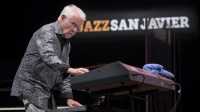
Robert David Grusin is an American composer, arranger, producer, and pianist. He has composed many scores for feature films and television, and has won numerous awards for his soundtrack and record work, including an Academy Award and ten Grammy Awards.
Josef Hofmann
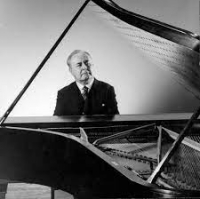
Josef Casimir Hofmann (originally Józef Kazimierz Hofmann; January 20, 1876 – February 16, 1957) was a Polish American pianist, composer, music teacher, and inventor.[1Josef Hofmann was born in Podgórze (a district of Kraków), in Austro-Hungarian Galicia (present-day Poland) in 1876. His father was the composer, conductor and pianist Kazimierz Hofmann, and his mother the singer Matylda Pindelska. He had also an older sister - Zofia Wanda, b. June 11, 1874 also in Krakow.
Muse

Muse are a British rock band formed in Teignmouth, Devon, United Kingdom in 1994 under the alias of Rocket Baby Dolls. The band comprises Matthew Bellamy (vocals, guitar and piano), Christopher Wolstenholme (bass guitar and backing vocals) and Dominic Howard (drums and percussion). Muse's style can be considered as a mixture of many musical genres, most notably alternative rock, classical music and electronica. Muse are known best for their energetic and visually dazzling live performances and on June 16th & 17th, 2007 became the first band to sell out the newly built Wembley Stadium in London. Muse have released four studio albums with their first, Showbiz, released in 1999, followed by Origin of Symmetry in 2001 and Absolution in 2003. The most recent, Black Holes & Revelations (2006), was also the most critically acclaimed, garnering the band a Mercury Prize nomination and a third place finish in the NME Albums of the Year list for 2006. Muse have won various awards throughout their career including 5 MTV Europe Music Awards, 5 Q Awards, 4 NME Awards and 2 Brit awards.
Georges Bizet

Georges Bizet (25 October 1838 – 3 June 1875) was a French composer and pianist of the Romantic era. He is best known for the opera Carmen.
Bizet was born at 26 rue de la Tour d'Auvergne in the 9th arrondissement of Paris in 1838. He was registered with the legal name Alexandre César Léopold Bizet, but he was baptised on 16 March 1840 with the first name Georges, and he was always known thereafter as Georges Bizet. His father Adolphe Armand Bizet (1810-86) was an amateur singer and composer, and his mother, Aimée Léopoldine Joséphine née Delsarte (1814-61), was the sister of the famous singing teacher François Delsarte.
He entered the Paris Conservatory of Music on 9 October 1848, a fortnight before his tenth birthday. His teachers there were Pierre Zimmermann (fugue and counterpoint; often assisted by his son-in-law Charles Gounod), Antoine François Marmontel (piano), François Benoist (organ) and, on Zimmermann's death, Fromental Halévy, whose daughter he himself later married. He won first prizes for organ and fugue in 1855 and completed his earliest compositions.
His first symphony, the Symphony in C, was written in November 1855, when he was seventeen, evidently as a student assignment. It was unknown to the world until 1933, when it was discovered in the archives of the Paris Conservatory library. Upon its first performance in 1935, it was immediately hailed as a junior masterwork and a welcome addition to the early Romantic period repertoire. The symphony bears a stylistic resemblance to the first symphony of Gounod, first played earlier in the same year, and which Bizet had arranged for two pianos although present-day listeners may discern a similarity to music of Franz Schubert, whose work was little known in France at the time the symphony was written.
In 1857, a setting of the one-act operetta Le docteur Miracle won him a share in a prize offered by Jacques Offenbach. He also won the music composition scholarship of the Prix de Rome, the conditions of which required him to study in Rome for three years. There, his talent developed as he wrote such works as the opera buffa Don Procopio (1858-59). There he also composed his only major sacred work, Te Deum (1858), which he submitted to the Prix Rodrigues competition, a contest for Prix de Rome winners only. Bizet failed to win the Prix Rodrigues, and the Te Deum score remained unpublished until 1971. He made two attempts to write another symphony in 1859, but destroyed the manuscripts in December of that year. Apart from this period in Rome, Bizet lived in the Paris area all his life.
Shortly after leaving Rome in July 1860, but while still touring in Italy, he had the idea of writing a symphony in which each of the four movements would be a musical evocation of a different Italian city – Rome, Venice, Florence and Naples. On hearing of his mother's serious illness he cut short his Italian travels and returned to Paris in September 1860; she died a year later. The Scherzo of the symphony was completed by November 1861, but it was not until 1866 that the first version of the whole symphony was written. He subjected it to a number of revisions through to 1871, but died before ever producing what he considered the definitive version. For this reason, the work is sometimes described as "unfinished", but this is an inaccurate description as it was fully scored. It was published in 1880 as the Roma Symphony.
Bizet was born at 26 rue de la Tour d'Auvergne in the 9th arrondissement of Paris in 1838. He was registered with the legal name Alexandre César Léopold Bizet, but he was baptised on 16 March 1840 with the first name Georges, and he was always known thereafter as Georges Bizet. His father Adolphe Armand Bizet (1810-86) was an amateur singer and composer, and his mother, Aimée Léopoldine Joséphine née Delsarte (1814-61), was the sister of the famous singing teacher François Delsarte.
He entered the Paris Conservatory of Music on 9 October 1848, a fortnight before his tenth birthday. His teachers there were Pierre Zimmermann (fugue and counterpoint; often assisted by his son-in-law Charles Gounod), Antoine François Marmontel (piano), François Benoist (organ) and, on Zimmermann's death, Fromental Halévy, whose daughter he himself later married. He won first prizes for organ and fugue in 1855 and completed his earliest compositions.
His first symphony, the Symphony in C, was written in November 1855, when he was seventeen, evidently as a student assignment. It was unknown to the world until 1933, when it was discovered in the archives of the Paris Conservatory library. Upon its first performance in 1935, it was immediately hailed as a junior masterwork and a welcome addition to the early Romantic period repertoire. The symphony bears a stylistic resemblance to the first symphony of Gounod, first played earlier in the same year, and which Bizet had arranged for two pianos although present-day listeners may discern a similarity to music of Franz Schubert, whose work was little known in France at the time the symphony was written.
In 1857, a setting of the one-act operetta Le docteur Miracle won him a share in a prize offered by Jacques Offenbach. He also won the music composition scholarship of the Prix de Rome, the conditions of which required him to study in Rome for three years. There, his talent developed as he wrote such works as the opera buffa Don Procopio (1858-59). There he also composed his only major sacred work, Te Deum (1858), which he submitted to the Prix Rodrigues competition, a contest for Prix de Rome winners only. Bizet failed to win the Prix Rodrigues, and the Te Deum score remained unpublished until 1971. He made two attempts to write another symphony in 1859, but destroyed the manuscripts in December of that year. Apart from this period in Rome, Bizet lived in the Paris area all his life.
Shortly after leaving Rome in July 1860, but while still touring in Italy, he had the idea of writing a symphony in which each of the four movements would be a musical evocation of a different Italian city – Rome, Venice, Florence and Naples. On hearing of his mother's serious illness he cut short his Italian travels and returned to Paris in September 1860; she died a year later. The Scherzo of the symphony was completed by November 1861, but it was not until 1866 that the first version of the whole symphony was written. He subjected it to a number of revisions through to 1871, but died before ever producing what he considered the definitive version. For this reason, the work is sometimes described as "unfinished", but this is an inaccurate description as it was fully scored. It was published in 1880 as the Roma Symphony.
Westlife
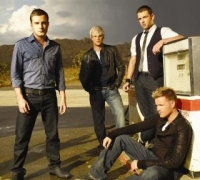
Westlife is an Irish pop band that was formed on July 3, 1998. They were signed on by Simon Cowell and are currently managed by Louis Walsh. Over the years, Westlife's music has evolved from teen pop to an adult contemporary sound, with an emphasis on ballads.
The group's original lineup comprised of Nicky Byrne, Kian Egan, Mark Feehily, Shane Filan , and Bryan McFadden. Filan and Feehily are the band's lead vocalists. All of the band members are songwriters, although most of their hits have been composed by external writers. On March 9, 2004, McFadden left the band to work on solo projects (before his departure, McFadden also contributed lead vocals).
Westlife has sold more than 40 million records worldwide. They garnered 14 number one singles in the United Kingdom, the third-highest in UK history, tying with Cliff Richard and tailing behind Elvis Presley and The Beatles. The band has also won numerous awards such as the "Best Irish Pop Act" at the annual Ireland Meteor Awards and ITV "Record of the Year" award in the UK. The band has also broken a few top records, including "Music artist with most consecutive number 1's in the UK" and the "Biggest selling arena act in the UK".
The group's original lineup comprised of Nicky Byrne, Kian Egan, Mark Feehily, Shane Filan , and Bryan McFadden. Filan and Feehily are the band's lead vocalists. All of the band members are songwriters, although most of their hits have been composed by external writers. On March 9, 2004, McFadden left the band to work on solo projects (before his departure, McFadden also contributed lead vocals).
Westlife has sold more than 40 million records worldwide. They garnered 14 number one singles in the United Kingdom, the third-highest in UK history, tying with Cliff Richard and tailing behind Elvis Presley and The Beatles. The band has also won numerous awards such as the "Best Irish Pop Act" at the annual Ireland Meteor Awards and ITV "Record of the Year" award in the UK. The band has also broken a few top records, including "Music artist with most consecutive number 1's in the UK" and the "Biggest selling arena act in the UK".
Evanescence

Evanescence is an American rock band founded in Little Rock, Arkansas in 1995 by singer/pianist Amy Lee and guitarist Ben Moody.
After recording two private EPs and a demo CD named Origin, with the help of Bigwig Enterprises in 2000, the band released their first full-length album, Fallen, on Wind-up Records in 2003. Fallen sold more than 15 million copies worldwide and helped the band win two Grammy Awards. A year later, Evanescence released their first live album, Anywhere but Home, which sold more than one million copies worldwide. In 2006, the band released their second studio album, The Open Door, which has sold more than four million copies.
The band has suffered several line-up changes, including co-founder Moody leaving in 2003, followed by guitarist John LeCompt and drummer Rocky Gray in 2007. Lee is now the only original member of Evanescence remaining in the band.
After recording two private EPs and a demo CD named Origin, with the help of Bigwig Enterprises in 2000, the band released their first full-length album, Fallen, on Wind-up Records in 2003. Fallen sold more than 15 million copies worldwide and helped the band win two Grammy Awards. A year later, Evanescence released their first live album, Anywhere but Home, which sold more than one million copies worldwide. In 2006, the band released their second studio album, The Open Door, which has sold more than four million copies.
The band has suffered several line-up changes, including co-founder Moody leaving in 2003, followed by guitarist John LeCompt and drummer Rocky Gray in 2007. Lee is now the only original member of Evanescence remaining in the band.
Paquito D'Rivera
Paquito D'Rivera is a Cuban-born jazz and classical music saxophonist and clarinetist. At the age of 5, D'Rivera became interested in music and appeared at a very young age with the Cuban National Symphony Orchestra.
Jimmy Cliff

James Chambers OM (born 30 July 1944), known professionally as Jimmy Cliff, is a Jamaican ska, rocksteady, reggae and soul musician, multi-instrumentalist, singer, and actor. He is the only living musician to hold the Order of Merit, the highest honour that can be granted by the Jamaican government for achievements in the arts and sciences.
 Daily Sheet Music is a web site for those who wants to access popular sheet music easily,
letting them download the sheet music for free for trial purposes.
It's completely free to download and try the listed sheet music, but you have to delete the files after 24 hours of trial period.
Don't forget, if you like the piece of music you have just learned playing,
treat the artist with respect, and go buy the original sheet music.
Daily Sheet Music is a web site for those who wants to access popular sheet music easily,
letting them download the sheet music for free for trial purposes.
It's completely free to download and try the listed sheet music, but you have to delete the files after 24 hours of trial period.
Don't forget, if you like the piece of music you have just learned playing,
treat the artist with respect, and go buy the original sheet music.